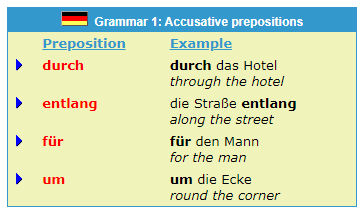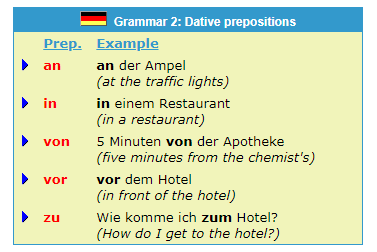Prepositions which take the accusative case
Prepositions are words such as "in", "on" and "over" which stand in front of a noun or pronoun to relate it to the rest of the sentence. In German, when these prepositions are used, the words for "the" (der/die/das) and "a" (ein) alter their endings depending on the case in which they are used.
We are already familiar with the accusative case, and have explained how "der" changes into "den" in the accusative case, and "ein" changes into "einen". This same change from "der" to "den" also happens after certain prepositions - we say that these prepositions "take" the accusative case. Some of the more commonly used German prepositions are listed below:

Many prepositions however take a case which is new to us - the dative case. For the definite article, the dative case means that both the masculine "der" and the neuter "das" change into "dem", and the feminine "die" changes into "der".
As regards to the indefinite article, the dative case means that both the masculine and the neuter "ein" change into "einem", wheras the feminine "eine" changes into "einer".
Some of the most commonly used German prepositions that take the dative case are:

There is an additional difficulty however, in that some prepositions can either take the accusative or the dative case, depending on context. The prepositions "an", "in" and "vor" take the dative case when they are describing a fixed position, but the accusative case when they are describing movement - "Er geht in das Hotel". We will look at this in more detail in a subsequent chapter.
The prepositions "von" and "zu" on the other hand, always take the dative case.
 英语
英语 日语
日语 韩语
韩语 法语
法语 西班牙语
西班牙语 意大利语
意大利语 阿拉伯语
阿拉伯语 葡萄牙语
葡萄牙语 越南语
越南语 俄语
俄语 芬兰语
芬兰语 泰语
泰语 丹麦语
丹麦语 对外汉语
对外汉语

